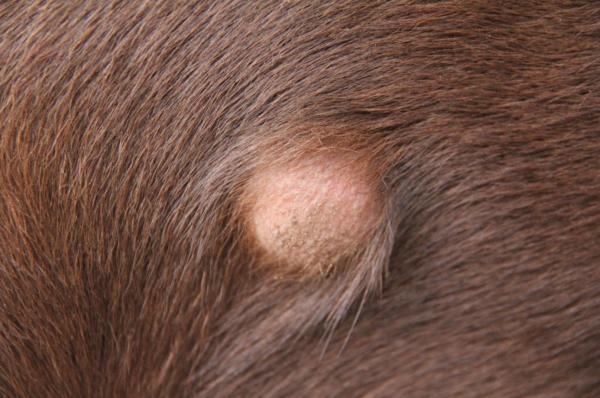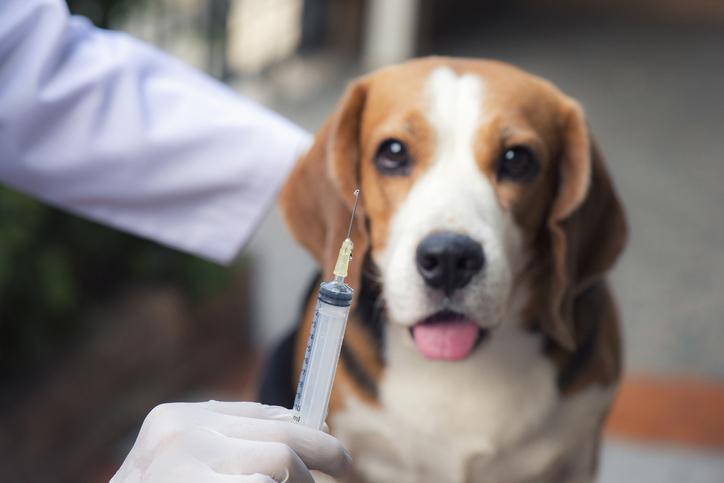Rabies Vaccine for Dogs - Schedule and Side Effects



See files for Dogs
The rabies vaccine for dogs is a preventive medication which is used to protect against one of the most deadly diseases in veterinary medicine. As with any other vaccine, a rabies vaccination will stimulate the dog's immune system with a modified form of the rabies virus known as an antigen. This antigen allows their immune system to recognize when a possible future infection might occur. Rabies is a zoonotic disease, meaning it is also very dangerous in human medicine. Protecting our dog against rabies protects our family and the greater community.
At AnimalWised, we look at the rabies vaccine for dogs, specifically its schedule and side effects. We also discuss the cost, legality and other factors we need to consider with this potentially life-saving preventive medicine.
What is the rabies vaccine for in dogs?
The rabies vaccine for dogs works just like any other vaccine. Vaccines are preparations of different pathogens that have been modified to become antigens so they do not trigger the disease. There are different types of antigen, but usually they are inactivated or only activated to a very small degree. They are generally administered in the form of an injection, although some may be administered orally or intranasally.
Once in the body, the antigen acts by stimulating the immune system which will be activated to eliminate the pathogen. In this way, it creates antibodies against which will be stored in the immune system for a certain amount of time. When the dog comes into contact with this pathogen in the future, their immune system will react quickly against it. This means the disease does not manifest itself or does not do so to a significant degree.
Vaccines are designed to combat serious, potentially fatal and highly contagious pathologies such as rabies. If a dog does not have the protection of vaccines, it is more likely their immune system will not be able to tackle the pathogen quickly enough, so the disease develops. With a very aggressive disease like rabies, this is particularly so.
Although the veterinarian will administer the rabies vaccine in a clinic, you can learn more about how to give a dog a shot under the skin with our related guide
What is the rabies vaccine for in dogs?
The rabies vaccine for dogs is necessary, not only to protect the dog, but to prevent the disease from being transmitted to humans. This is because rabies is a zoonosis, i.e. a disease which can be transferred from dogs to humans. Although there are areas in which rabies is considered eradicated, there are still parts of the world where contagion is possible. These include parts of Asia and South America with a particular issue in India[1].
The reason for this eradication in many areas is thanks to preventive measures such as vaccinations. In many countries, rabies vaccinations are mandatory for pets such as dogs, cats or even ferrets. Rabies is a horrendous disease which can make the dog very aggressive, encouraging contagion of the disease. If a dog does not receive treatment for rabies promptly, it will be fatal. This is why preventive vaccination is so important.
.

At what age are dogs given the rabies vaccine?
The rabies vaccine for dogs can be accessed by visiting your veterinary clinic. This vaccine is administered around 3-4 months of age. When a puppy is born, we need to take them to a veterinarian for assessment. At this time, the veterinarian will setup a vaccination schedule for the dog. This vaccination schedule is often mandatory, but not always. However, we stress its importance in safeguarding the welfare of the dog.
If we adopt an adult dog, we can give them the vaccine after the veterinary check-up and internal deworming. This is always recommended before each vaccine application. The veterinarian will set the most appropriate schedule for you based on your dog's specific situation.
Learn more about the vaccination schedule for puppies and dogs with our related guide.
How often is the rabies vaccine given to dogs?
Vaccines offer immunity to the dog, but not all of them will do be effective during the animal's entire lifespan. This is why it is necessary for rabies booster shots administered periodically. The rabies vaccine for dogs can guarantee protection for up to three years. However, the efficacy does lessen over time. For this reason, most veterinarians will recommend annual rabies booster shots for dogs.
We will need to ensure we meet the requirements set out in your local animal welfare legislation. You can research this online, but it is best to speak to your veterinarian about it. There are many doubts dog guardians have about when their canine should or should not be vaccinated. While the vet will help with your specific dog, you can take a look at our related article on whether you can bathe a dog after vaccination to learn more.
Rabies Vaccine Side Effects in Dogs
It is rare for vaccines to cause any serious side effects and the rabies vaccine for dogs is no exception. However, we will still need to detail possible side effects of rabies vaccination in dogs. They include:
- General malaise (first 24 hours)
- Fever
- Reluctance
- Swelling at injection site
- Abscess (where there was inflammation before)
- Allergic reaction
Allergic reaction to rabies vaccine in dogs
The symptoms of discomfort and reluctance generally subside on their own. However, in case of allergy, it would be considered an emergency situation, so it should be attended to by the veterinarian immediately. Although it is very unlikely, it is possible the dog will enter anaphylactic shock which will be considered a veterinary emergency.

Is the rabies vaccine required by law?
Vaccinations may be optional in some countries, although this may vary according to local legislation. In the United States, the rabies vaccination is legally required by law in all 50 states. Since it is a zoonotic disease transmissible to humans, it is considered a larger public health hazard.
Policing whether a dog is vaccinated is not always very strict. Many guardians will not even bring their dog for a veterinary checkup after they are born, let alone set up a rabies vaccination schedule.
What happens if I don't vaccinate my dog against rabies?
As with cost and availability, the legality of rabies vaccination will depend on the geographic location. Even in areas where it is a legal requirement to vaccinate your dog, many guardians will not do so. This could be due to neglect, prohibitive costs or simple personal preference. In the USA, your dog is legally required to have a proof of vaccination certificate. If you are caught without one, you may incur a serious fine.
More than the legal requirements, not vaccinating your dog against rabies makes them more vulnerable. Even dogs which don't spend as much time outside are vulnerable to the disease if they come across any animal with the rabies. Since it is such a killer, we recommend the peace of mind a rabies vaccination can provide for any dog guardian.
Learn more about vaccination schedules for dogs with our article on the DHLPP vaccine for dogs.

Rabies vaccine in dogs cost
There is no one price for the rabies vaccination. The cost will depend on various factors, including:
- Location: the cost of a rabies vaccine differs according to country, state and even individua veterinary clinic.
- Type: not all rabies vaccines and booster shots cost the same.
- Fees: some clinics will combine visitation and other fees with the vaccination cost itself.
- State regulations: some states may have regulations which ensure a maximum price for the vaccine.
Since the spread of rabies is a larger public health hazard, there are often many schemes set up to ensure all dogs can be vaccinated. There are also charities and other support networks which may be able to help with paying vaccination fees for your dog. With all of this in mind, we can say that rabies vaccinations in the United States will cost between $15 to $50, but this is just a rough estimate.
This article is purely informative. AnimalWised does not have the authority to prescribe any veterinary treatment or create a diagnosis. We invite you to take your pet to the veterinarian if they are suffering from any condition or pain.
If you want to read similar articles to Rabies Vaccine for Dogs - Schedule and Side Effects, we recommend you visit our Vaccination category.
1. Rahman, S. A., & Isloor, S. (2018). Rabies on the Indian subcontinent. Rabies on the Indian subcontinent. Revue scientifique et technique (International Office of Epizootics), 37(2), 529–542. https://doi.org/10.20506/rst.37.2.2821
- Carlson and Giffin. (2002). Practical manual of canine veterinary medicine. Madrid. Editorial Drac.







